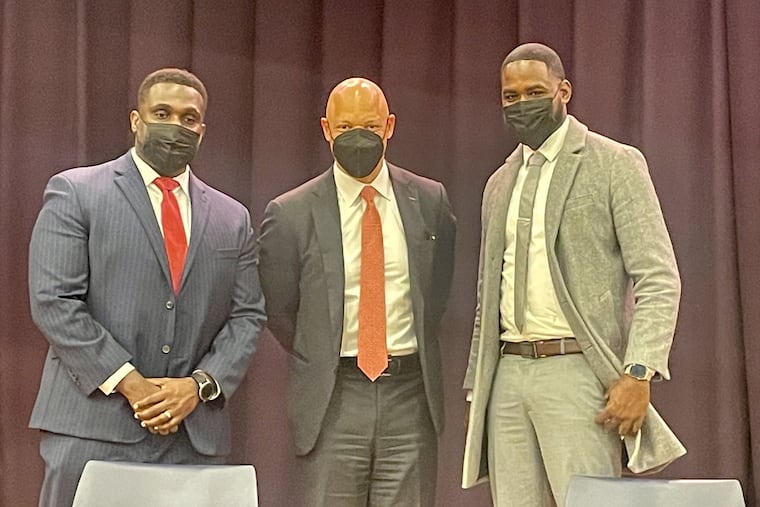Philly schools will invest $3 million to develop more Black, Latino, and Asian principals
Black men, and Latino and Asian people are underrepresented among district principals. “We want the representation of these three groups to increase,” Deputy Chief of Leadership Michael Farrell said.

Darnell Bolds is just who the Philadelphia School District wants to become a principal: born and raised in North Philadelphia, a graduate of public schools.
When Bolds, who is Black, left the electrical-engineering field to become a Philadelphia special-education teacher in 2016, he fell in love with his new profession — the practice of teaching but also its implications.
“I saw the effect that my presence, dedication, and tough-but-fair approach was having on my 15 students,” Bolds said. And he wondered: What if he could affect hundreds of children at once?
To encourage Bolds and other aspiring principals and assistant principals, the Philadelphia School District will spend $3.1 million over the next three years in a program that pays current district employees in leadership roles — teacher coaches, climate managers, special-education case managers — to earn administrator credentials while working. Those selected for the program will receive a $25,000 scholarship toward tuition at program partners Temple University and the University of Pennsylvania, and attend classes while keeping their district jobs.
“Pathways to Leadership,” funded to support a pipeline of 75 would-be administrators over the next three years, is open to any eligible employee but aims particularly to help more Black men and Latino and Asian educators in their paths to principalship. Those groups are underrepresented in Philadelphia leadership ranks, Michael Farrell, the district’s deputy chief of leadership development, said at a Thursday news conference announcing the program.
Currently, 24% of the district’s 120,000 students are Black males, but just 13% of those in principal ranks are Black males; 24% of students are Latino, but only 7% of principals are Latino; and 10% of students are Asian, and only 3% of the district’s principals are Asian. (Black women are better represented in principal ranks; they make up 23% of district pupils, and 35% of principals.)
“We want the representation of these three groups to increase,” Farrell said of Black men and Latino and Asian people. “Future leaders of color are strongly encouraged to apply.”
In addition to traditional coursework, those in the program will receive coaching and mentorship and must attend a summer institute. Coursework will be tailored toward the practical reality of leading in the Philadelphia School District; in budgeting lessons, for instance, the aspiring principals will work with district staff on real district school budgets.
They must commit to working in the district for three years after they complete the program, which enrolled a small pilot group this year and will begin in earnest this summer.
Superintendent William R. Hite Jr. said the program was tailored to people like Bolds, a promising educator who spent time as a teacher and dean before becoming climate manager of Edward T. Steel Elementary in Nicetown. Bolds, a graduate of Olney High School, has been among the first cohort of the Pathways to Leadership program, juggling work and classes at Temple University. His mentor is Steel principal Angikindslows Senatus.
“Part of this work is a recognition that we have great leaders within our schools already, and want to ensure that we have pathways for those individuals to pursue leadership opportunities,” Hite said at the news conference, held in the Steel auditorium.
Interested district employees must apply for the 2022 cohort this month.
The number of assistant principals and climate managers has swelled recently. A few years ago, there were just 50 assistant principals; now, there are 250, Farrell said. One hundred were added in the last year alone — in part due to federal COVID-19 money.
The district typically hires 15 to 25 new principals a year.
Both Hite and Farrell acknowledged the strain the pandemic has put on educators, particularly on principals, who have needed to become public health experts, managing urgent health and safety matters on top of staffing challenges, social and emotional needs, and classroom instruction.
Burnout is common, but Philadelphia has not “seen the numbers of principal resignations that other districts are experiencing ... knock on wood,” Hite said.
The district offers layered-on support for all early-career principals, and that’s helped, said Senatus, the Steel principal.
The mentoring and coaching he received as a new principal “has been a big support, especially as we navigate tremendous challenges,” Senatus said.